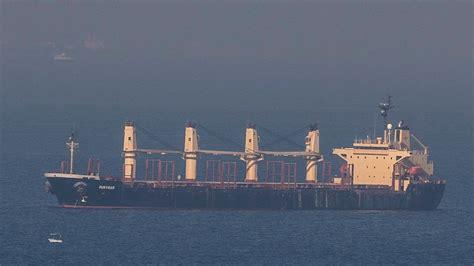
Crew Abandons Cargo Ship After Houthi Missile Attack
The crew of a cargo ship in the Red Sea was forced to abandon ship after it came under attack on Monday from the Houthi militia in Yemen, who have been firing missiles at ships in the Red Sea and Gulf of Aden in what the group says is a campaign to pressure Israel to end its war in the Gaza Strip.
The attack on the ship, the Rubymar, appeared to be one of the Houthis’ most damaging so far. Most of the armed group’s missile and drone assaults on ships have failed to inflict serious damage.
But the strike on Monday night, involving two anti-ship ballistic missiles launched from Yemen between 9:30 and 10:45 p.m., according to the U.S. military, was enough to drive the crew off the vessel. The military’s Central Command said that one of the missiles struck the Rubymar, “causing damage” and prompting the crew to make a distress call.
A warship that is part of a U.S.-led coalition, as well as another merchant ship, responded to the call, and the crew was taken “to a nearby port by the merchant vessel,” Central Command said in a statement.
A Houthi military spokesman, Yahya Sarea, said in a statement on Monday that the militia had fired “a number of missiles” at the vessel, severely damaging it, bringing it to a “complete halt” and leaving it “at risk of sinking.” The New York Times could not verify those claims.
An employee who answered the phone at the Rubymar’s management office in Lebanon, GMZ Ship Management, confirmed that the attack had taken place and that the crew had abandoned ship, but said the company would not provide further information until the crew reaches a safe port.
A British government maritime agency also reported that a ship had come under attack about 30 nautical miles south of al-Mokha in Yemen, prompting the crew to abandon it. The agency did not identify the ship.
The Houthis, an Iran-backed militia that controls much of northwestern Yemen, have carried out dozens of attacks on ships in the Red Sea and the Gulf of Aden over the past few months, portraying the attacks as a campaign to pressure Israel to end its siege on Gaza.
Initially, they said they were attacking ships owned by Israelis or sailing to and from Israeli ports, but they have targeted ships unrelated to Israel and going to other destinations. In early January, the United States and Britain formed a military coalition that has been carrying out airstrikes in Yemen in an attempt to deter the attacks, and since then the Houthis have vowed to target American and British ships as well.
The Rubymar, a bulk carrier, sails with a Belize flag, but its registered owner is based in Britain, according to Equasis, a maritime database.
Mr. Sarea, the Houthi military spokesman, said the Houthis “will not hesitate to take more military measures” against “all hostile targets in defense of beloved Yemen and in confirmation of the position of support for the Palestinian people.”
Though most of the group’s attacks have caused limited damage, they have still upended global shipping. Yemen overlooks the Red Sea and the Gulf of Aden, a key shipping lane that leads to the Suez Canal. Hundreds of ships are now avoiding the Suez Canal and sailing an extra 4,000 miles around Africa, burning fuel, inflating costs and adding about 10 days of travel in each direction.
The U.S.-led coalition has repeatedly hit missiles and launchers in Yemen and intercepted drones and missiles, but so far it has failed to halt the attacks. The United States struck five Houthi targets, including an underwater drone, over the weekend.
On Monday, the European Union announced that it was launching its own operation to counter the threat posed by the Houthis, with plans to accompany vessels and protect them against attacks in the Red Sea, the Gulf of Aden and nearby waterways.
“The European Union is responding swiftly to the necessity to restore maritime security and freedom of navigation in a highly strategic maritime corridor,” Josep Borrell, the European Union’s High Representative for Foreign Affairs and Security Policy, said in a statement.
Source » nytimes.com





